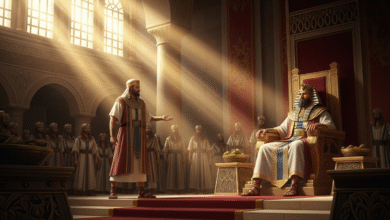The story of Moses, peace be upon him: The great confrontation, the miracles of survival, and the liberation of the Israelites from oppression

In the book of the great prophets, the story of Mosesshines as one of the most magnificent epics of the eternal struggle between right and wrong, between the light of monotheism and the darkness of tyranny. It is a story full of remarkable miracles that defied the laws of nature, successive trials that refined faith, deep lessons in perseverance in the face of tyrants, absolute certainty of God’s victory,and the importance of wise leadership that leads an oppressed people to freedom and dignity. From a child born in a time when males were slaughtered for no fault of his own, to a great leader facing the greatest tyrant in history, the arrogant Pharaoh, Moses’ story is an eternal reminder that God’s victory will inevitably come to those who believe in Him, have patience with His command, and rely on Him.
Birth in a time of slaughter: The hidden wisdom of divine omnipotence
The story of Moses, peace be upon him, began in very harsh circumstances, filled with brutality and injustice. The Pharaoh of Egyptwas a tyrant who claimed divinity for himself and enslaved the Israelites, torturing them, using them for hard labor, slaughtering their newborn male children and sparing the females. This persecution was the result of a vision that Pharaoh saw in a dream, indicating that a child born among the Israelites would be the cause of his demise. In this atmosphere of fear and anticipation, Moses, peace be upon him, was born.
Moses’ mother, at the height of her fear and confusion over her newborn, was inspired by a great and very strange divine command, one that transcends human logic: To put her infant son in a coffin (a wooden box) and throw him into the flowing Nile River. This was a tremendous challenge to her faith and trust in her Lord, how could she throw her baby into an unknown fate? But she trusted in the promise of her Lord, who does not break promises.
Evidence: The Qur’an mentions this divine inspiration that reassured the frightened mother in Surah Taha:
وَأَوْحَيْنَا إِلَىٰ أُمِّ مُوسَىٰ أَنْ أَرْضِعِيهِ ۖ فَإِذَا خِفْتِ عَلَيْهِ فَأَلْقِيهِ فِي الْيَمِّ وَلَا تَخَافِي وَلَا تَحْزَنِي ۖ إِنَّا رَادُّوهُ إِلَيْكِ وَجَاعِلُوهُ مِنَ الْمُرْسَلِينَ
(Surat Taha: 38).
She threw him into the river, and his sister Maryam walked to follow his trail secretly, watching for his fate. By God’s power and wisdom, the servants of Pharaoh’s family picked him up from the river, and by God’s grace, Moses was raised by his sworn enemy, in Pharaoh’s own palace! God cast His love into the heart of Pharaoh’s woman, Asia, who was a righteous woman, and she saw light and innocence in the child, so she asked her husband not to kill him, and to take him as their son, to be the apple of her and his eye.
Here is another miracle: Moses refused all the breastfeeders that were brought to him; he would not accept any woman’s breast. His sister suggested that she show them a household that would sponsor him and nurse him, and they agreed. Thus, Moses was returned to his mother to nurse him and foster him in Pharaoh’s palace, for which she was paid, and God’s promise to return him to her and make him one of the messengers was fulfilled. Moses grew up in Pharaoh’s palace, but his heart was with the Israelites who were oppressed and enslaved outside the palace walls.
The killing incident and the migration to Madin: Maturity and preparation to carry the message
When Moses was of full strength and was walking in the city, he found two men fighting: One of them was an Israelite (his people), and the other was a Coptic (Pharaoh’s people). The oppressed Israelite called for help, and Moses poked the Coptic so hard that he accidentally killed the Coptic. Moses regretted his action and realized that he had done wrong, so he turned to his Lord in repentance and forgiveness.
Evidence: The Almighty said on the tongue of Moses, peace be upon him, confessing his guilt and asking for forgiveness:
قَالَ رَبِّ إِنِّي ظَلَمْتُ نَفْسِي فَاغْفِرْ لِي فَغَفَرَ لَهُ ۚ إِنَّهُ هُوَ الْغَفُورُ الرَّحِيمُ
(Surat al-Taqs: 16).
Pharaoh learned of the incident and wanted to kill him as retribution for the Coptic. A man from the far end of the city (said to be a believer of Pharaoh’s family) advised Moses to flee the city quickly, because Pharaoh and his people were plotting to kill him. Moses went out in fear, not knowing where to go, but he relied on his Lord and prayed: “Lord, deliver me from the unjust people” (Stories: 21).
Moses set out for the land of Midian, a land outside of Pharaoh’s dominion. After an arduous journey, he arrived at a water well, where he found shepherds watering their flocks and two women tending to their sheep. Moses went ahead and watered them, then went into the shade and prayed to his Lord. Their father, the Prophet Shu’ayb, peace be upon him (or a righteous man from the people of Midian), learned of Musa’s strength and honesty, so he invited him to him and married him to one of his daughters, and Musa stayed for ten years, during which he fulfilled his dowry, in a quiet environment away from the oppression of Pharaoh, learning to herd sheep, maturing and preparing to carry the great message that awaited him.
Revelation and prophecy: God’s words and miracles
After Moses had completed the agreed-upon period of time, he and his people set out to return to Egypt. On the way back, on a cold, dark night, near Mount Tor, he saw a fire in the distance. He went to investigate the matter, and there was the great encounter and the direct divine instruction that no other prophet had ever received. His Lord called him from the right-hand side of Al-Tur in the blessed spot of the tree.
Evidence: The Qur’an describes this majestic meeting that witnessed the beginning of Moses’ prophethood in Surah Taha and Al-Qasas:
فَلَمَّا أَتَاهَا نُودِيَ مِن شَاطِئِ الْوَادِ الْأَيْمَنِ فِي الْبُقْعَةِ الْمُبَارَكَةِ مِنَ الشَّجَرَةِ أَن يَا مُوسَىٰ إِنِّي أَنَا اللَّهُ رَبُّ الْعَالَمِينَ (30) وَأَنْ أَلْقِ عَصَاكَ ۖ فَلَمَّا رَآهَا تَهْتَزُّ كَأَنَّهَا جَانٌّ وَلَّىٰ مُدْبِرًا وَلَمْ يُعَقِّبْ ۚ يَا مُوسَىٰ أَقْبِلْ وَلَا تَخَفْ ۖ إِنَّكَ مِنَ الْآمِنِينَ (31) اسْلُكْ يَدَكَ فِي جَيْبِكَ تَخْرُجْ بَيْضَاءَ مِنْ غَيْرِ سُوءٍ ۖ وَاضْمُمْ إِلَيْكَ جَنَاحَكَ مِنَ الرَّهْبِ ۖ فَذَانِكَ بُرْهَانَانِ مِن رَّبِّكَ إِلَىٰ فِرْعَوْنَ وَمَلَئِهِ ۚ إِنَّهُمْ كَانُوا قَوْمًا فَاسِقِينَ (32)
(Surat al-Taqs: 30-32).
In this great encounter, God gave him two great miracles as proof of his prophethood before Pharaoh: His staff that turns into a seeking serpent (a great snake), andhis hand that comes out white without evil (it shines a light white). He ordered him to go to Pharaoh to call him to the monotheism of God and to free the Israelites from his slavery. Moses was in awe of the greatness of the task, and asked his Lord to send his brother Aaron with him, because he was more articulate and able to explain, so God answered his prayer and made Aaron a prophet and minister to him.
The great confrontation with Pharaoh: Miracles and endless stubbornness
Moses and Aaron, peace be upon them, returned to Egypt, entered Pharaoh, presented the call to monotheism, and asked him to send the Israelites with them. They presented him with proofs and miracles that proved their sincerity and prophethood, but Pharaoh was arrogant and stubborn, increased his tyranny, accused them of witchcraft, and summoned the great magicians of Egypt to confront them.
On the Day of Adornment, a major feast day for the Egyptians, Moses met with Pharaoh’s magicians in front of a large crowd of people. The magicians threw their ropes and sticks, and they turned into living creatures with a great optical illusion that amazed the audience. Then Moses threw his staff, and it turned into a great real serpent, devouring all the ropes and sticks thrown by the magicians. In front of this remarkable miracle that exceeded the limits of magic, the magicians realized that this was not human magic, but a truth from God and a divine power, and they prostrated themselves, believing in the Lord of Moses and Aaron.
Evidence: The Qur’an depicts the magicians’ faith and change of heart in Surah Taha:
فَأُلْقِيَ السَّحَرَةُ سُجَّدًا قَالُوا آمَنَّا بِرَبِّ هَارُونَ وَمُوسَىٰ
(Surat Taha: 70).
Pharaoh was angered by the faith of his magicians, and punished them severely, cutting off their hands and feet, and crucifying them, but they remained steadfast in their faith. God then sent nine signs (consecutive miracles) to Pharaoh’s people as punishment and proof of Moses’ sincerity, so that they might turn back from their disbelief. These verses included
- Deluge: Heavy rains and floods inundated their land and homes.
- Locusts: Massive swarms of locusts ate their crops and spoiled their agriculture.
- Lice: Lice infest their bodies and homes.
- Frogs: Frogs are everywhere, in their homes, eating, drinking.
- Blood: The water of the Nile and all their water turned into blood.
- Obliterating their property: Destroying their money and property.
- Lack of fruits: Lack of crops and bounty.
- scab: Barrenness and drought.
- Divide and conquer: (or the stick and the white hand)
Whenever a calamity befell them, they appealed to Moses to lift it from them, promising to believe and send the Israelites, but when God removed it from them, they reneged on their covenant, became arrogant, and returned to their tyranny.
Exodus and the liberation of the Israelites: The miracle of the parting of the sea and the destruction of the oppressors
After Moses, peace be upon him, despaired of the faith of Pharaoh and his people, and after he had exhausted all means of invitation and warning, God inspired him to take the Israelites by night and leave Egypt in disguise. Moses complied with his Lord’s command, and the Israelites, who numbered in the hundreds of thousands, set out towards the Red Sea.
Pharaoh learned of their departure and gathered his great army, which included his best knights and soldiers, and went after them in anger and hatred, determined to annihilate them. When Moses and the Israelites reached the shore of the Red Sea, they saw Pharaoh’s mighty army behind them and the raging sea in front of them, with no escape. Despair and fear gripped the hearts of the Israelites, and they said to Moses: “We are doomed!” (i.e., Pharaoh will catch us and destroy us).
But Moses, peace be upon him, was firmly convinced of God’s victory, and his faith did not waver for a single moment, so he said to them with a reassuring and confident heart:
Evidence: The Almighty said in Surat al-Shu’araa:
قَالَ كَلَّا ۖ إِنَّ مَعِيَ رَبِّي سَيَهْدِينِ
(Surat al-Shu’araa: 62).
God inspired Moses to strike the sea with his staff.
Evidence: The Almighty said in Surat al-Shu’araa, describing this miraculous miracle:
فَأَوْحَيْنَا إِلَىٰ مُوسَىٰ أَنِ اضْرِب بِعَصَاكَ الْبَحْرَ ۖ فَانفَلَقَ فَكَانَ كُلُّ فِرْقٍ كَالطَّوْدِ الْعَظِيمِ (63) وَأَزْلَفْنَا ثَمَّ الْآخَرِينَ (64) وَأَنجَيْنَا مُوسَىٰ وَمَن مَّعَهُ أَجْمَعِينَ (65) ثُمَّ أَغْرَقْنَا الْآخَرِينَ (66)
(Surat al-Shu’araa: 63-66).
The sea split by the power of God, and became a dry road between two great mountains of water, through which Moses and the Israelites crossed in peace and safety. When Pharaoh and his soldiers followed them, they entered the dry road, and when their entry was complete, the sea closed over them by God’s command, and they all drowned, making their destruction an example to the world, and proof of the end of injustice and tyranny. God preserved Pharaoh’s body to be a sign for those after him, so that people could see the fate of the arrogant.
Conclusion: Timeless lessons from the Prophet’s story
The story of Moses, peace be upon him, is one of the richest stories in the Qur’an with endless lessons and lessons:
- Persistence in the face of tyrants: How true faith gives its owner unshakable strength in the face of the might of the oppressors, that the right is superior to the wrong, and that injustice, no matter how long it lasts, has an inevitable end.
- Absolute certainty of God’s victory: Even in the darkest and most desperate circumstances, when the sea is in front of you and the enemy is behind you, the certainty that God is with you is the key to relief and survival, and that sincere tawakkul opens the doors of the impossible.
- The importance of wise leadership and patience with followers: Moses’ leadership of the Israelites, despite their stubbornness, weak faith and frequent grumbling, shows the importance of a leader who establishes and guides his people with patience, wisdom and compassion.
- The consequences of arrogance and stubbornness: The story of Pharaoh and his soldiers is a constant warning about the consequences of arrogance against the truth, insisting on falsehood, and not responding to God’s clear signs.
- Miracles of God: A sign of His oneness and power: The miraculous miracles with which God supported Moses were conclusive proofs of God’s oneness and His absolute ability to change cosmic laws to protect His servants and uphold the truth.
- Joy after adversity: The whole story is a series of adversity followed by relief, to teach the nation that with hardship comes ease, and that victory comes after patience.
The story of Moses, peace be upon him, is the story of the eternal struggle between good and evil, between justice and injustice, and always emphasizes that the outcome is for the pious, and that God Almighty does not fail His believing servants, but rather saves them, gives them victory and empowerment, and destroys their enemies.
What is the most important lesson that the story of Moses left you with after reading it in such detail?




